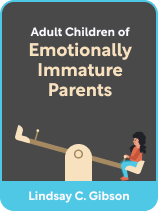

This article is an excerpt from the Shortform book guide to "Adult Children of Emotionally Immature Parents" by Lindsay C. Gibson. Shortform has the world's best summaries and analyses of books you should be reading.
Like this article? Sign up for a free trial here.
What is emotional childhood neglect? How do parents emotionally neglect their children?
To understand how emotional childhood neglect happens, you first have to look at the parents. In Adult Children of Emotionally Immature Parents, Lindsey Gibson looks at the common features and types of emotionally immature parents, and the impact their behavior has on their children.
Read below for a better understanding of emotional childhood neglect.
Understanding Emotionally Immature Parents and Their Impact
Gibson argues that understanding how your parents came to be emotionally underdeveloped reveals information that can help you navigate your relationship with them. Not all parents who instigate emotional childhood neglect do so intentionally or maliciously. Knowing why your parents operate the way they do can help you choose how—and how much—to interact with them.
Generally speaking, emotionally immature parents grew up with a caretaker who severely restricted their ability to express their emotions. Children deprived of the opportunity to express a full range of their true feelings, or who learn that some feelings are unacceptable, can’t develop an integrated sense of self. Instead, their energy goes into building their defenses, which take over and become so intertwined with who they are that they’re intractable. What’s left is a person who’s a patchwork of unpredictable, inconsistent feelings.
When highly defensive children grow up and become parents, their capacity to have healthy relationships with their own children is restricted because they lack the tools needed to engage in emotionally healthy ways. Their ability to change this depends on whether they can self-reflect. Most, unfortunately, cannot.
By contrast, Gibson defines emotionally mature parents as caretakers who are comfortable with emotions and attuned to their children’s emotional needs. Emotionally mature parents create a sense of security for their children by consistently demonstrating an interest in their well-being, validating their emotions, showing affection and comfort, and being emotionally dependable.
Features of Emotionally Immature Parents and Their Impact
Gibson says that emotionally underdeveloped parents share a number of common features. Understanding what they are can a) help you determine if your parent was emotionally immature and b) move forward from the hurt you suffered at their hands. Below, we’ll examine three of the most prominent features of emotionally underdeveloped parents and their negative impact on children.
Feature 1: They’re Deeply Preoccupied With Themselves
Gibson says that emotionally immature parents are highly self-centered, not necessarily because they’re narcissistic, but because they question their self-worth so deeply they’re unable to take other people into consideration. As a result, they’re unable to identify, relate to, or meaningfully acknowledge their child’s feelings, interests, and needs. Emotionally immature parents often:
- Rely on their child to meet and soothe their emotional needs. For example, they may complain and seek guidance from their child about their marital problems.
- Expect their child to intuit their feelings—then act out in emotionally volatile ways if the child doesn’t. For example, if the parent is unhappy, they may lash out or silently mope until the child feels as miserable as they do and figures out a way to solve their problem.
- Demand compliance and obedience from their child, requiring the child to do what they want, when they want, in the way they want. They may punish or shame the child for failing to behave in the manner they see fit.
Impact on You
In response to your parent’s self-centeredness, you may:
- Have grown up believing that your feelings, interests, and needs were unimportant because your parent failed to meaningfully acknowledge them
- Have suppressed or turned anger toward your parent against yourself
- Feel that you have to engage with your parent entirely on their terms to have a relationship with them
Feel emotionally dependent on—not emotionally connected with—your parent because they always told you what to do
Feature 2: They’re Ruthlessly Self-Protective
Gibson argues that emotionally underdeveloped parents are notoriously defensive because they’re anxious, insecure, and fragile, terrified of being seen as bad, wrong, or unlovable. They’re often unable to tolerate criticism or engage in self-reflection. They also tend to be reactive, dismissive of others’ concerns, and unable to apologize.
When called out for behavior that’s insensitive to or hurts their child, they’re likely to say that wasn’t their intention and, as a result, they’re not responsible for the problem. They want instant forgiveness and acceptance and insist on moving forward from problems as if they don’t exist.
Impact on You
You may have grown up believing that you were the source of, and solely responsible for fixing, problems in your relationship with your parent—even ones you didn’t cause. As an adult, you may have this same feeling in other relationships and have difficulty seeing or holding others responsible for their role in problems. You may take blame for things that aren’t your fault.
(Shortform note: Although it doesn’t come naturally to them, experts assert that people with a low sense of self-worth should hold others accountable for problems they cause. When you hold your significant other responsible for their actions you treat them as a full partner and adult. But when you shield them from blame, you fail to show them the respect they deserve as your equal.)
Feature 3: Their Emotions and Thinking are Restricted
Gibson states that emotionally immature parents often display a limited range of emotions and thinking that can hinder their ability to connect emotionally with their child. This is because their parents discouraged them from engaging with multiple emotions. As a result, they may show only one emotion at a time, they may only be interested in fact-based or intellectual conversations rather than emotional ones, and they may get agitated when their child doesn’t agree with them. These can discourage children from expressing their individuality.
Impact on You
You may have grown up feeling emotionally alone because your parent didn’t engage with you at an emotional level or on subjects you found interesting. As an adult, you may feel you have to agree with others about everything for them to like and value you.
The Four Types of Emotionally Immature Parents
The features we just discussed manifest in different ways to produce four types of emotionally underdeveloped parents. Each type resides on a spectrum of severity from moderate to profound. Additionally, some parents contain traits from multiple types.
Type 1: Emotionally chaotic
This parent is unable to regulate their emotions and relies on their child and others to ground them emotionally. Their unpredictability leaves everyone around them on edge and fearing that they’ll be the next target of the parent’s unhappiness. Their emotions govern the household.
Type 2: Relentlessly Goal Focused
This parent relentlessly pushes their child to achieve goals they believe are important and judges their progress without regard for the child’s feelings or needs. Because they often grew up in an emotionally deprived household and consider themselves self-made, they’re certain they know what’s best for their child.
Type 3: Hands Off
This parent disengages from decision-making that impacts their child and passively allows situations to unfold. They often partner with a dominant person and are seen as the “easier,” “fun” parent. They often look away when their partner rages or is abusive toward their children because they don’t see their role as “protector” and want to avoid the abuse themselves.
Type 4: Aggressively Disinterested
This parent wants nothing to do with their children and rejects their child’s efforts to engage with them emotionally. They’re typically irritable, surly, cold, mocking, and can be overtly abusive.

———End of Preview———
Like what you just read? Read the rest of the world's best book summary and analysis of Lindsay C. Gibson's "Adult Children of Emotionally Immature Parents" at Shortform.
Here's what you'll find in our full Adult Children of Emotionally Immature Parents summary:
- A look at the damage that emotionally neglectful parents can do to their children
- Strategies to help adults turn their relationship with their parent from toxic to tolerable
- Ways to heal and move forward from childhood emotional neglect






